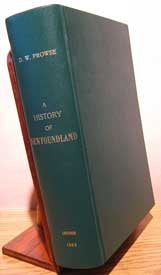Cat No.: CA0439:
This wonderful and authoritative: “History of Newfoundland from the English, Colonial, and Foreign Records,” was researched, assembled, and written by D. W. (Daniel Woodley) Prowse, Q.C. Mr. Prowse was born in Newfoundland and, as the middle child in a family with 7 offspring, he was expected to make his own way in the World - which he accomplished in a most spectacular way.
After his initial education in Newfoundland he furthered his education in England and Spain, and on completion he took up the law being called to the Bar in 1858. He launched with gusto into the practice of law, politics, justiciary writing, as well as manifold other public services. He also pursued a very active social life both intellectual and relaxing. He was even known to have performed comic songs in public. This activity brought him into contact with a great many others who formed Newfoundland “society” so it was no great surprise when he was approached to become a judge in the circuit court, leading finally to his becoming a Judge of the Central District Court of Newfoundland.
On his retirement from public office he threw himself whole-hearted into what had formerly been his “hobbies” one of the results being the final publication of this history although it also represents the work of many years of researching, finding, and collecting, the materials and intelligence it contains. He at first published it locally in Newfoundland in very limited quantities but published a much larger second addition in London, England. It is from the 2nd edition that this digital version has been produced.
A previous user has inscribed the front fly sheet with his opinion; “This book is worth much more than its weight in gold.” And it weighs over 4 lb!
The Dictionary of Canadian Biography comments on this book: “A hundred years after its appearance in 1895 Prowse’s History remains unchallenged, for the four centuries that it covers, as the best (some would say “unfortunately the best”) general history of Newfoundland.”
Prowes wrote an extensive “Introduction” to his book and we could do no better than use selected extracts from this Introduction to provide the reader with a ”compact” description of his work:
“This work is an attempt to describe how England's first colony, Newfoundland, was founded and developed ; to show the influence of its discovery on the making of England. My plan has been to cite contemporary documents, for the most part hitherto unprinted.”
“…Here England first obtained a foothold in the new world, and laid the foundation of her Colonial Empire. For more than one hundred years Newfoundland was Britain's one and only Colony; her trans-Atlantic fishery the sole link that bound Europe to North America.…”
“Beginning in a small way in 1498, year by year witnessed the rapid growth of this Newfoundland business, the accumulation of wealth, the constant building of larger ships ; carried on almost by stealth from the West Country seaports, it is only by brief references in the chronicles and Acts of Parliament that we can trace the development of a great industry, which must necessarily have had immense influence on the maritime prosperity of the lesser England of the Tudor age, when the burthen [burden] of the whole Royal Navy was less than the tonnage of a modern first-class cruiser.…”
“To the early American settlers Newfoundland was the parent Colony, a meagre and haggard kind of mother, yet for all that she saved the ancient Colony of Virginia from semi-starvation by a timely cargo of fish. When the New York settlers first tried to establish a fishery at Sandy Hook, it was to this Colony they applied for appliances and men. The same Devonshire adventurers who traded to and colonised Newfoundland were the first to make a similar attempt in New England. The Newfoundland trade was by far the greatest English enterprise in America up to 1630.”
“It must be borne in mind that from 1497 to the permanent settlement in Virginia and the landing of the Pilgrim Fathers in 1620, Newfoundland was the only Colony and the only possession in North America occupied and governed by Englishmen; …”
“I have attempted to reconstruct the true history of Newfoundland from these various documents, to bring to life again the dead and buried memories of the men who made the country, to recount the doughty deeds of the old Devon sailors who, against tremendous odds, retained this island for England without the slightest help from the Crown.”
“The history of Newfoundland may be roughly divided into four great epochs of nearly equal duration:—-
• The early or chaotic era, from 1497 to 1610, when the Island was a kind of no man's land, without law, religion, or government, frequented alike by English and foreign fishermen, only ruled in a rough way by the reckless valour of Devonshire men, half pirates, half traders.
• The Fishing Admiral period, from 1610 to 1711, a dismal time of struggle between the colonists and the western adventurers or ship fishermen from England. This may also be designated the colonisation period.
• The Colony under Naval Governors, 1711 to 1825; the advent of the first resident Governor, Sir Thomas Cochrane.
• The modern era, the struggle for autonomy.”
“Side by side, as the old colony began to grow, arose in the early days of James I new colonies in Virginia and New England. The few impoverished fishermen and farmers, who were half starved at Plymouth, soon blossomed into prosperous communities, which spread out and separated into the country which now forms part of the Great Republic. In less than twenty-five years after the landing at Plymouth Rock, there were dealings between Newfoundland and the new settlements.”
“All through this strange, eventful history, Newfoundland settlers of all kinds, from Guy and Baltimore down to the poorest waif from the West of England, had to fight for their lives with the dire hostility of the ship-fishermen or western adventurers from England. In the olden time these men had conquered the country, and they looked upon it as their own. Charters were given them by the Crown, conferring on them outrageous rights and privileges. From the days of the second Charles, the Home Government always supported their pretensions.”
“The third period of our colonial history commences about 1711. At this date we find some attempt at government in the appointment of Captain Crowe, RN., who convened an assembly of the principal inhabitants, a crude copy of the New England town meeting, and by mutual consent established a rude code of laws. The British Government had been for over two centuries endeavouring to rule the country without government, and to establish a judiciary without an Act of Parliament. In 1728 the first regular naval governor was appointed in the person of Captain Osborne, R.N. The floating governors, to a certain extent, exercised authority over those judicial monstrosities, the fishing admirals.”
“To many of my readers, especially my Newfoundland readers, the documents set forth in these pages will be considered the most interesting part of the book—they are chiefly from unpublished records ; by others they may be looked on as the very dry bones of history. In order to satisfy my two sets of readers, I have therefore put these old documents in the appendices to the chapters, where the diligent student of our real history may peruse them, and the lighter-minded reader pass them by.”
This book has a page count of 742 pages - quite a “significant volume” and is liberally illustrated with contemporary photo-reproductions, line drawings, and copies of “official” documents obtained from various national, and private, archives. Also reproduced is a contemporary coloured, fold out (18” x 21 1/2”) map of Newfoundland and Labrador bearing many original place names. In spite of the original book being adequately supplied with Tables of Contents and Illustrations, and an extensive Index, we have made all the printed text computer searchable and enhanced the search speed with our “FastFind” technology.
No. of CDs is: 1 ; Format is: PDF ; Searchable?: YES;
FastFind: Yes; ISBN No.: 978-1-927503-55-3 ;


